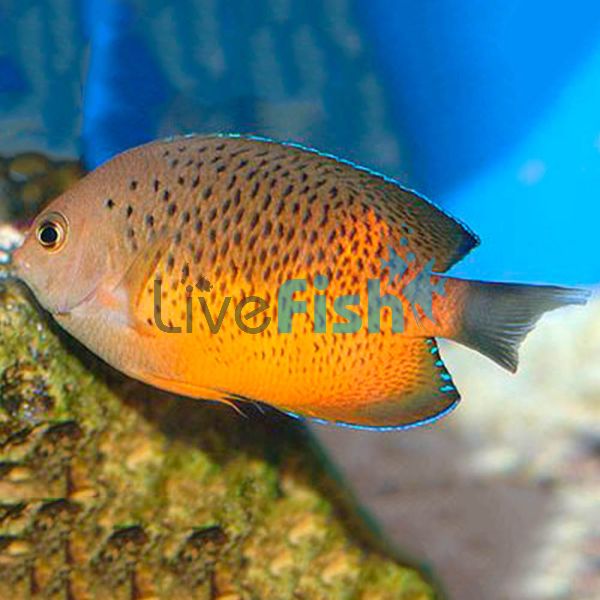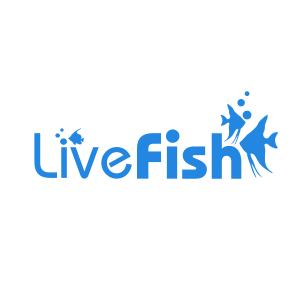Rusty Angelfish - Medium
The Rusty Angelfish has a flashy colour scheme and is great for helping control algae growth. The Rusty Angelfish is a brightly coloured dwarf Angelfish. Its body is a striking orange colour with a covering of small black lines/spots. The tailfin is clear and the dorsal and anal fins are dark with neon blue trim.
Rusty Angelfish
The Rusty Angelfish is a brightly coloured dwarf Angelfish. Its body is a striking orange colour with a covering of small black lines/spots. The tailfin is clear and the dorsal and anal fins are dark with neon blue trim.
There are reports of Rusty Angelfish being reared in captivity, but not bred in captivity. All juveniles are female, the dominant female in a group will change sex to become male. Spawning occurs at dusk, a week before a full moon, between December and May. They are broadcast spawners, rising towards the surface to release eggs and sperm.
This species can be found in the Western Pacific. In locations such as Indonesia, Japan, Taiwan, and the Philippines. Their native environment is on rocky, coral reefs between 3-30 metres.
Tank Recommendations for the Rusty Angelfish
Rusty Angelfish should be kept in a tank that is at least 55 gallons (208 litres) capacity. A mated pair will need a tank that has 75-100 gallons (284-379 litres) capacity.
While this species can stay in a reef tank with monitoring, it is better suited to a fish only tank. It will nip at corals and consume polyps. They need a mature tank with plenty of algae growth and areas of rubble and rockwork for grazing and hiding.
There should be enough light to promote algae growth. If the tank lighting is insufficient, the tank can be arranged so direct sunlight hits it.
Suitable Tank Buddies
The Rusty Angelfish is considered to be semi-aggressive. Yet, it is less aggressive than most other dwarf Angelfish.
It will be aggressive to conspecifics and similar species. It is recommended to keep it as the only dwarf Angelfish in a tank.
Usually Compatible
Suitable tank buddies include small semi-aggressive fish such as Clownfish and Anthias. Crustaceans won't be threatened by Rusty Angelfish.
Sometime Compatible
Small peaceful fish such as Gobies, Assessors, and Dartfish will need monitoring. Rusty Angelfish may harass them in smaller tanks. A male/female pair of Rusty Angelfish can stay in a tank that is larger than 75 gallons. A 100-gallon tank is required for cohabiting with fish that don't look similar. Small aggressive fish such as Dottybacks or Damselfish may cause the Rusty Angelfish to hide and not feed. Larger semi-aggressive fish such as Angelfish and Tang needs to be monitored for the same reason.
Rarely Compatible
Avoid larger aggressive predators such as Groupers and Sharks. These species may be able to swallow Rusty Angelfish whole. Rusty Angelfish can pose a threat to slow movers such as Seahorses and Pipefish.
Feeding Your Rusty Angelfish
The Rusty Angelfish is an omnivore. It needs to consume plenty of vegetable matter, as well as live and frozen foods. Suitable products include spirulina, Angelfish preparations, marine algae, Mysis shrimp, and krill. Feeding should occur in small amounts 2-3 times per day.
| Scientific Name | Centropyge ferrugatus |
|---|---|
| Care Level | Moderate |
| Common Names | Rusty Angelfish, Rusty Dwarf Angelfish, Rusty Angel, Rusty Pygmy Angelfish. |
| Diet | Omnivore |
| Fish Family | Pomacanthidae |
| Lifespan (years) | 10 |
| Max. Length (cm) | 10 |
| Min. Tank Volume (l) | 208 |
| Origin | Western-Pacific; Indonesia, Japan, Taiwan, Philippines |
| Reef Safe | With Caution |
| Sociability | Semi-aggressive |
| Venomous | No |
| Water Conditions | 21 - 27°C, dKH 8-12, pH 8.0-8.5, sg 1.020-1.026 |




